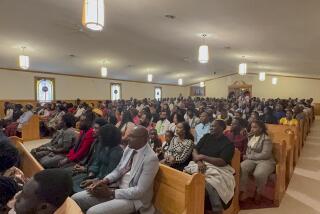Gulf Refugees, Southern Hosts Feel Strain of Exodus
RALEIGH, N.C. — Al-Ali Basim, his 22-year-old wife and his 12-month-old daughter sported broad smiles last month as they stepped off the charter flight carrying evacuees from Iraqi-occupied Kuwait.
U.S. Embassy officials there had told them they would be treated here as returning American citizens. Basim, a 26-year-old Jordanian who received his civil engineering degree at the University of Louisiana, expected to find a home, a car and possibly a job.
But their smiles quickly faded. The job never materialized. The apartment that social workers found for the Basims after they spent over a week in a hotel was burglarized the first night.
Today, the Basims are living on welfare for the first time in their lives.
“I would go back to Kuwait tomorrow if I could,” Al-Ali Basim laments. “Maybe we would die in chemical warfare, but at least I wouldn’t die ashamed of not being able to feed my family.”
The Basims’ bitter experiences underscore the difficulties faced by many of the Arabs who have landed here in recent weeks as part of an effort by the State Department to evacuate all those caught in Kuwait who had American--or at least Western--ties.
In all, more than 1,000 refugees landed here in four evacuation flights. Roughly 120 have chosen to stay--more than in any other jurisdiction in the country. Half a dozen families from a final flight that arrived a week ago still are in motels.
U.S. officials made central North Carolina a reception area, both because of its unusually good airport and medical facilities and its gracious Southern lifestyle. But the influx has overloaded social services here and caused resentment among some residents.
“Sure we feel a bit dumped on,” says Jim Wight, Raleigh’s director of social services, who has headed the evacuee-processing effort. “We’re happy to do our duty and help out, and we’re doing the best we can, but we’re stretched beyond our limits. We’re trying to cope.”
United Way director Stephen Dudek says Raleigh residents, notably generous with their charity in the past, have not flocked to help the evacuees as he might have expected.
“Some of the Arabs are so hostile and arrogant,” a Wake County social worker complained, slamming down the receiver of her phone after a hostile exchange. In another instance, a Kuwaiti family enraged their host by refusing to carry their suitcases. They thought it was her job.
Part of the problem is the huge cultural difference between the new arrivals and their American hosts.
For some of the refugees, particularly those from oil-rich Kuwait, living here is a major economic comedown.
“Back home I had a maid and a nanny,” says Sana Arab, a Kuwaiti mother. “Now I have to care for all three children alone, and I am very anxious about it.”
Still others find it annoying to see the Arab women’s traditional flowing long gowns treated as curiosities in local grocery stores.
“I don’t understand why my wife is a stranger sight than the hippies out there,” Basim says, “but she is to the locals.”
Although each of the refugees has some legal link to America, often it is tenuous--say, having a baby who was born in the United States.
“Everyone was anticipating American families,” says Wight, but “when they got off, they didn’t look American. I thought, what the hell is getting off this plane?”
Most of the resettled families say they were invited to come here by U.S. Embassy officials in Kuwait because their wives or children were born in America--and would be prime targets for Iraqi retaliation.
But once here, the refugees face the reality that the United States does not recognize the parents as either American citizens or political refugees. And their immigration status as “parolees” does not entitle them to work longer than five months, even though “most of the families are middle- and upper-middle-class professionals and anxious to work,” says Bettye Kelly, deputy director of social services for Durham County.
Dot Aner Alnabulsiy, a Kuwaiti engineer, was ready to begin work with the North Carolina Department of Transportation when officials phoned to tell him they could not hire him for more than five months.
“It the government tells me that, you can imagine what private companies will tell me,” Alnabulsiy says.
Some brought their entrepreneurial spirit with them. One man was handing out business cards as soon as his flight came in. The next day, he had a 10:30 a.m. job interview.
As the refugees kept coming, Wake County’s emergency fund ran out and workers grew more frustrated.
“We were prepared for maybe three families, who, we were told may have no place to go,” Wight recalls. “Instead, we got 27 families in four planeloads within 29 days.”
Wight’s staff worked more than double time to help settle 112 people in Raleigh from the first three flights. Five additional families, trapped in North Carolina while on vacation during the Iraqi Aug. 2 invasion, also requested aid.
“I’ve worked hurricane disaster relief, and I’ve worked this, and I’d rather work in hurricanes,” he said.
Raleigh was chosen as the destination for chartered flights because “it met all the necessary requirements,” a State Department official says. “They did so well, we gave them more flights.”
“That’ll teach us not to give them a Southern reception,” Wight retorts. “We’ll treat them like Yankees next time.”
Some local residents believe that an Arab community has already taken root in Raleigh and may attract more evacuee families who will take up permanent residence here.
Urabi Mustafa, Shaw University’s International Studies director who organized an informal volunteer corps of about 60 Arab-Americans to help settle the refugees, said there now are more than 2,500 Arab-Americans in the Raleigh area.
“There are larger Arab communities in the country--like in Detroit, Chicago, and L.A.,” he says. “But I think they stay here mostly because of the weather.”
“The weather is good here,” agrees Emmad Suliman Soltan, who was a civil engineer in Kuwait. “It is a good environment. It is not too expensive, there are some job openings, and the schools are good too.”
There are signs that the families are settling in. Most had lived in America before, either as students or during the period when their children were born.
The children seem to be adjusting best of all. Thirty-two have been placed in schools.
“They seem very well behaved and quiet,” says Wiley elementary school principal Ed Garicialainor. “All the parents came to open house. They wanted to know what books the kids would be using. One parent even requested his (5-year-old) child get homework.”
“They learn quickly, but they do have a lot to learn,” says Gloria Arriagada, who teaches English to nine of the children.
At the school, Ferial, a 6-year-old girl who arrived just a week ago, copied an American student’s lead in outlining a Halloween pumpkin on the chalkboard.
But instead of the triangular eyes and devilish grin of her friend’s pumpkin, Ferial drew olive-shaped eyes. And after detailing a fine nose, she added hair, arms and legs to her pumpkin.
When she saw the American looking on curiously, she became confused and quickly erased her sketch, substituting a snake with a smile.
“We haven’t gotten around to explaining Halloween yet,” Arriagada laughed. “That’s going to be hard.”
More to Read
Sign up for Essential California
The most important California stories and recommendations in your inbox every morning.
You may occasionally receive promotional content from the Los Angeles Times.









